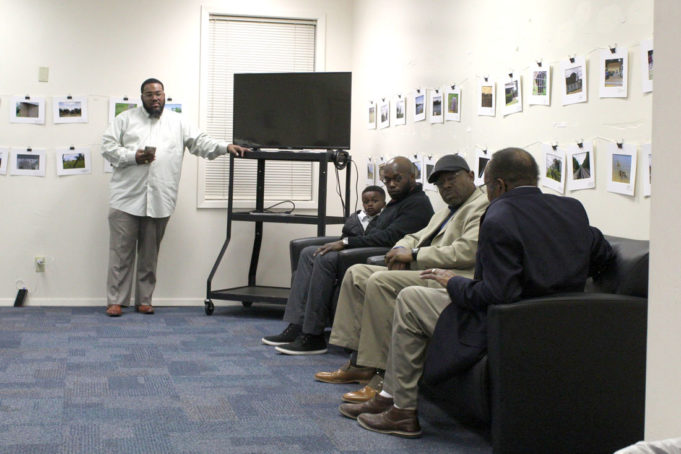The voicemail was enthusiastic.
“Please come,” said Quinton Phillips, cofounder of a four-year-old nonprofit addressing racial problems and economic disparity on the East Side. “Come as a reporter or come as yourself. We would love to have you.”
Later that evening, Phillips led a panel discussion at a community center in the Stop Six neighborhood. The area, which suffers from above-average unemployment and high crime rates, is home to CommUnity Frontline and its cofounders: Phillips, Derek Carson, Franklin Moss Jr, and Dante Williams.
Well over a dozen men and women of various ethnic backgrounds listened as Phillips led the discussion billed “Where We’ve Been and Where We’re Going.”
“Black kids continue to rank at the bottom of test scores,” Phillips said. “What is the problem? How can we rectify this?”
Panelist Simeon Henderson said the problem is multi-layered.
“The education system we have is built on [models from] the industrial revolution,” said Henderson, district executive director for Fort Worth YMCA. “In Fort Worth, YMCAs serve 1,400 kids. One of the things that we are doing is focusing on STEM. How do we engage the future generations? I know that it is a crisis that we need to be able to resolve soon.”
The questions were then passed to the audience.
“I’m 50,” one male said. “I don’t want to be 70 or 75 and see the same old same old. How do we, as a group, ensure economic development in all Fort Worth communities?”
Former Fort Worth City Councilmember Franklin Moss said evenly distributed development comes down to planning.
“Many of our black and Hispanic communities didn’t have [city representatives] taking a serious stance on coming up with a plan to make things better within our communities,” he said, referring to city planning and attention that has and continues to favor white communities.
Henderson put it simply.
It’s all about “land, labor, and capital,” he said. “If you are not controlling the land and capital, then all you control is the labor.”
The meeting ended in high spirits. CommUnity Frontline volunteers mentioned an upcoming community movie night before everyone gathered in a circle for a ceremonial send-off.
A few days later, I met up with Phillips at Black Coffee near Texas Wesleyan University. He was beaming, both for the fact that the coffee shop is owned by a black female entrepreneur and for how far Stop Six has come since he was a teenager. Phillips graduated in 1999 from nearby Paul Laurence Dunbar High School before graduating from Prairie View A&M University with a degree in social work. CommUnity Frontline’s other founders similarly attended Prairie View before returning to Stop Six. The decision to move back to an economically deprived Fort Worth neighborhood was deliberate, he said.
“We are investing in this community because [Stop Six] invested in us,” he said.
The sentiment may seem at odds with the realities of growing up in what was a violent neighborhood. Gang culture was at its height in the late 1980s and early 1990s, as it was in many urban U.S. cities at the time. Despite the constant threat of shootings, Phillips’ childhood recollections revolve around strong community leaders and public school educators who taught him to never let outside perceptions frame what was possible.
“If there were 29 of us, 28 didn’t have a father in the home,” Phillips said. “Men like Franklin Moss were showing us what manhood looked like.”
After college, Phillips and his former Dunbar classmates formed a men’s Bible study group to keep in touch and continue the kind of community activism that their Stop Six elders and community leaders had shown them. Coat drives and neighborhood cleanups were an active part of the group’s community-minded ministry. After 10 years, Phillips and the core of what would become CommUnity Frontline realized that meeting Stop Six’s multifaceted needs required a fresh approach.
Around four years ago, CommUnity Frontline was founded as a brotherhood of men who are “committed to addressing and solving the problems that cause suffering” in black communities.
Going through the formalities of forming a tax-exempt charity wasn’t done so CommUnity Frontline could rake in donations, Phillips said. The volunteer-driven venture needed legitimacy in the eyes of government officials and established groups. Incorporating as a nonprofit was the best way to do that, he said.
During CommUnity Frontline’s first meeting, Phillips, Williams, and the other founding members reached out to the community for input on what were the most pressing issues facing Stop Six residents. Each grievance was immediately written on a large whiteboard for all to see. When the session ended, the community organizers realized that there were four core areas that the community had concerns about: city beautification, police/community relations, race relations, and education. CommUnity Frontline’s programming was then developed to address those four areas.
With the group no longer under the banner of a Bible study group, volunteerism swelled, Phillips said. Residents of Stop Six had always had pride in their community, but there hadn’t always been an outlet to effect change, he added. Neighborhood cleanups became so effective that large swaths of Stop Six no longer needed the walk-through cleanings, Phillips said.
As a teen, the cofounders of CommUnity Frontline used to attend household movie nights as a means of staying off violence-ridden streets. Although gang violence is no longer the omnipresent threat it once was, Phillips said, movie nights still serve as a means of building community and providing a free night of entertainment for overstretched families.
Race relations are addressed through community conversations, Phillips added.
“We didn’t see a space where people were having a conversation about race,” he continued. “When do you have the opportunity to ask the ‘ignorant questions’ without being shot down? Come in and be who you are. We feel like that goes a long way toward solving racial problems. We bust out the whiskey, we chill, eat barbecue, and talk about race.”
Cleaning neighborhoods and hosting movie nights offer some modicum of quick results. Helping communities deal with mistrust of law enforcement after too-frequent killings of unarmed black men and women by police officers has proven to be CommUnity Frontline’s most formidable challenge, but Phillips sees hope for trust-building in this area.
Beyond the obvious need for Fort Worth police officers to cease shooting unarmed black residents, Phillips sees communication and basic semblances of humanity as the keys to building trust with black communities.
“I understand the liability issues with talking to the community after a shooting,” he said. “It does not mean that you cannot show your humanity. There is no greater pain in the world than the loss of life. Come be a human being without being defensive.”
Many in the Stop Six community see and understand the double standard that allows white officers to walk free while awaiting their trial for murder.
“A lot of anger comes from the lack of accountability for the loss of life,” he said. “These officers are going home. The common man would be in jail if he shot someone. There has to be accountability.”
The nonprofit hosts conversations between police officers and members of the community to humanize both groups. The conversations allow the community to see officers as the men and women they are, Phillips said, and it allows officers to know the people in the Stop Six community.
“It means something when you hear a police officer say, ‘That hurt me too,’ ” Phillips said, referring to open conversations about the loss of life at the hands of police officers.
In late 2018, the city’s Race and Culture Task Force made a series of recommendations to Fort Worth City Council. The volunteer task force was formed in the wake of national outcry over the heavy-handed arrest of Jacqueline Craig, a black mother, and her daughter. After considering an independent citizen review board (something many in Fort Worth still advocate for), city officials settled on a police monitor system.
Denise Rodriguez, who has served as a police monitor in two cities, and Kim Neal, the former executive director of the Citizens Complaint Authority in Cincinnati, have been hired for the job. The monitors will field civilian complaints and act as independent reviewers of the Fort Worth police department. The new positions are active, according to the city.
CommUnity Frontline cofounder Williams has been closely following the launch of the new police monitors. Phillips said his nonprofit is “encouraged” by the process so far. For the monitors to maintain legitimacy in the eyes of the community, they must remain neutral to all parties, he said.
“The minute they start skewing to any side, that’s when the other side begins to push back,” he said.
Many of the recommendations from the Race and Culture Task Force are still being implemented. CommUnity Frontline organizers remain cautiously optimistic about the prospects for meaningful change under the city’s current leadership, Phillips said.
“Are we going to see the solutions, or are we going to tiptoe around to appease this or that group?” he asked. “Action has to be taken. If those things begin to happen, you’ll see more people in this city start to feel that it is all of our city instead of the segregated way it looks right now.”












